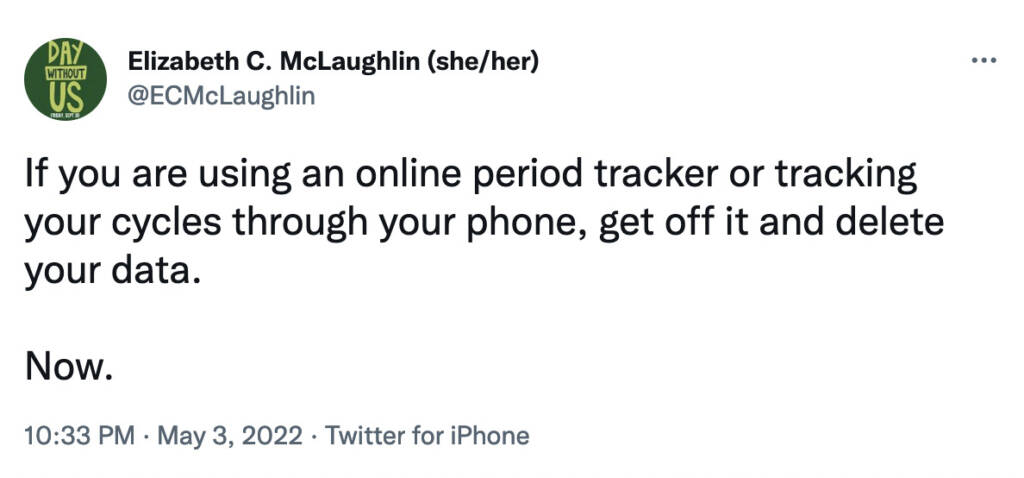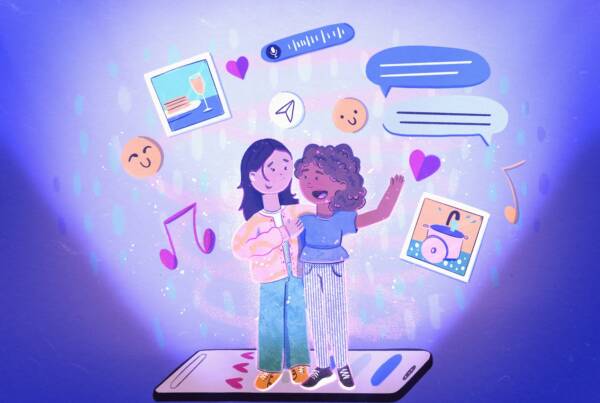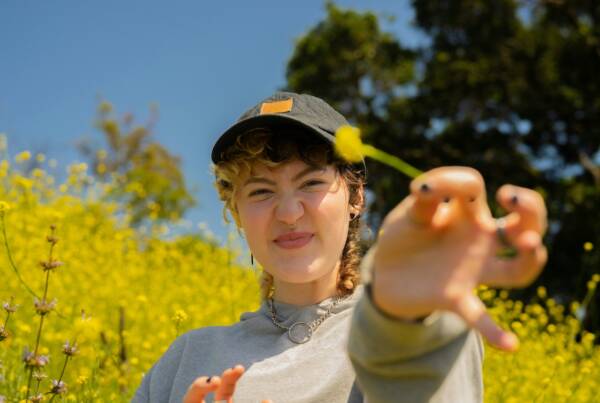Writing by Brigitte Murphy // illustration by Nea Valdivia
For a lot of us growing up, periods were kept pretty private. Pads were passed secretly from friend to friend. We were separated from our male classmates and told about the blood and pain we should expect. Nicknames were given to our periods in an attempt to keep the big secret exactly that, a secret.
As I’ve grown up, periods have slowly moved out of the shadows. Our understanding and education around the menstrual cycle has increased. The “that time of the month” trope and the taboos that surround menstruation are slowly but gradually diminishing.
On the 24th of June, myself and the rest of the world watched from afar as the US Supreme Court overturned Roe V Wade, the monumental 1973 decision confirming the constitutional right to abortion.
But a new concern soon took over social media. Women’s privacy on period tracking apps could be jeopardised and weaponised. I couldn’t help but think about how far we’ve come from quietly pushing through period pain to feeling empowered and comfortable with menstruation. And how once again, we could be discussing our periods in the shadows. Are women in the US already discussing their cycles in the shadows?
A twitter thread that caught my and many other peoples attention was posted by Elizabeth C. McLaughlin. McLaughlin is the CEO of Gaia Project Consulting, LLC and founder of the Gaia Project for Women’s Leadership. Her tweet read simply, “If you are using an online period tracker or tracking your cycles through your phone, get off it and delete your data. Now.”
 McLaughlin continued in the thread to provide information and her thoughts on the matter saying “a prosecutor can subpoena your period data from any company and that company can be forced by a court to comply”. She finished by urging her audience to “exercise utmost caution”.
McLaughlin continued in the thread to provide information and her thoughts on the matter saying “a prosecutor can subpoena your period data from any company and that company can be forced by a court to comply”. She finished by urging her audience to “exercise utmost caution”.
This thread wasn’t the first discussion of data in relation to period tracking apps that had come across my feed; I had seen it on TikToks and Twitter just before the overturning of Rove V Wade. But this was the first time I stopped and truly thought about it.
In Australia we are removed from the consequences of Roe V Wade being overturned, but many of us are still considering what it means and how it could impact us.
I have been tracking my cycle since my first period. Firstly, in my diary and then, on my phone’s notes and eventually on an app. I would like to note that when I first learnt that some apps share our data with third parties, I switched apps to ensure my data was protected. But for many women they don’t feel safe using a tracking app at all.
Jemimah Sinclair, a friend of mine, told me that she doesn’t use a tracking app as she worries about her data and where it might end up. “For this specific reason, it’s a handwritten note for me”, she said.
I reached out to the Office of the Australian Information Commissioner to ask a few questions about data privacy. A spokesperson from the OAIC said “Any private sector organisation that provides a health service and holds health information is covered by the Privacy Act 1988 for all their activities and must comply with the Australian Privacy Principles (APPs)”.
The spokesperson also said, “importantly, the Privacy Act applies to organisations that are based outside of Australia where they collect or hold personal information in Australia”.
“The Privacy Act imposes obligations on organisations that handle sensitive health information including around how they can collect, use and disclose an individual’s personal information”.
Finally I asked, is there truly a safe way to track your health information like a period on an app? Especially when there are so many terms we may not be 100% sure about.
“There is no simple answer to this question. It depends on the personal information handling practices of each app, the security and governance measures they have in place to protect personal information, and whether they have taken a privacy-by-design approach. Health information is regarded as sensitive information and must be protected in line with the requirements and obligations in the Privacy Act. You should satisfy yourself as much as possible that you understand how your information will be used (including whether your personal information will be shared with third parties) and are comfortable that you can provide consent that is fully informed, current and specific and voluntary,” a spokesperson from OAIC said.
I still use a period tracking app, but I make sure I know where my data is going and check in with the terms of service regularly. While there is no definite answer on how you should track your circle, make sure you are well aware of your privacy, where your data is ending up and the terms of service you are agreeing to.
Protecting ourselves online is as important as ever.
From what I’ve found, the best way to take care of ourselves online is to know what’s going on and to stay curious, ask questions and do your best to know where and how your data is used.
The OAIC has provided some tips on how to build good privacy habits.






